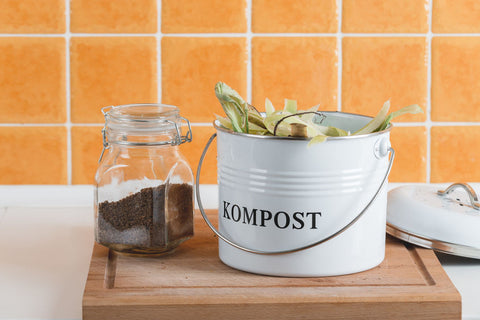Whenever you invest time, effort, and money into the quality of your garden’s soil, it yields the best results in the health of your plants and in your harvests. If you're used to buying your compost, maybe you've never realized that you can easily (and inexpensively) make your own.
What is composting?

Composting is basically the process that turns leftover food scraps into more fertile soil for your plants. Microorganisms break down various organic materials (e.g. leftover fruit and vegetable peels, stems, eggshells, etc.) to help create a fertile, rich soil that can provide the necessary nutrients to your plants. Composting also helps you greatly reduce the amount of wasted food at home.
What you can use in your compost bin and what you shouldn't compost
All fruits and vegetables are compostable, as well as eggshells and shellfish shells (they add a great source of calcium). You should avoid adding meat, bones, dairy, whole eggs, and pet feces to your compost in order to avoid attracting rodents and insects.
Also, avoid adding processed foods as much as possible, like bread and rice, so that your compost can decompose properly.
If you live in an apartment with houseplants or herb containers, you can get started with composting by burying leftover food scraps at their bases. Composting can be as easy as adding coffee grounds, tea bags, or fruit/vegetable leftovers to your plants. All you're doing is fortifying the soil with organic materials.
Include dry carbon materials to your composting scraps
If your compost becomes too wet and damp, it won't decompose as well. In addition to fruit and vegetable leftovers, you also need to add dry, carbon materials to the mix, also known as "browns."
Browns include things like brown paper bags, coffee grounds, egg cartons, and newspapers, and you should include two handfuls of browns for every handful of fruit and vegetable scraps. Mind that you avoid adding anything bleached (e.g., paper towels) or waxed (e.g., milk cartons).
Composting in your backyard
The easiest way to begin composting is in your backyard (if you have one) by making your own compost bin. Drill holes into the bottom of a large plastic bin (to help with airing out the compost). Then, stand it upright, and coat the bottom with a layer of browns (leaves are perfect for this), and then you can start adding your leftover food scraps. Stir the mixture every few days with a rake, broom handle, stick, or shovel to continue airing out the compost so it decomposes faster.
You can always buy a compost bin if you don't want to make one.
If you don't have a backyard
An outdoor area dedicated to composting isn't necessary, but you will likely need some basic equipment.
If you do want to up your composting game, but don't have your own backyard space, you might try finding a local compost drop-off area or community garden with a compost program. You can frequently find compost drop-offs programs in urban areas.
At that point, you just need a small plastic bucket with a lid to gather composting scraps. Don't forget to add browns to your bucket as needed before dropping off your compost every week.
Also remember, compost needs to air out to decompose properly, or it just becomes a slimy, smelly gob.
What can you compost?
Here is a list of several items from your kitchen you can compost, plus a list of compostable browns:
- Fruit and vegetable scraps
- Coffee grounds
- Loose-leaf tea
- Spoiled soy/rice/almond/coconut milk
- Crumbs
- Cooked pasta and rice
- Spoiled pasta/tomato sauce
- Spoiled tofu/tempeh
- Seaweed, kelp
- Old herbs and spices
- Pumpkin/sunflower/sesame seeds
- Avocado pits
- Old jelly/jam
- Stale beer/wine
Compostable browns
- Crushed eggshells and seafood shells
- Used tea bags (made of natural materials like hemp or cotton. If in doubt, open and compost the used tea leaves)
- Any unwaxed cardboard boxes
- Shredded brown paper bags
- Used unwaxed paper plates
- Nutshells (EXCEPT for walnut shells, as they are toxic to plants)
- Burnt, unpopped popcorn kernels
- Discarded pizza crusts
- Old oatmeal
- Cut up, cardboard egg cartons
- Old wine corks
- Toothpicks/bamboo skewers
Be patient
Composting is either a long process or a short one, depending on a few things. If your compost is hotter and stirred more frequently, it will break down faster (so in the winter months, it will take longer). Just remember to add browns (one handful of browns to one handful of scraps), and stir the mixture frequently. You will end up with an excellent compost to nourish your plants.
Once you've started with your own composting, it may take four weeks up to six or more months to fully compost your leftover food scraps.
Protect your plants with a botanical garden spray
In addition to nourishing your plants to help them grow, you also want to keep them safe and healthy from effects caused by weather, plant pests, and plant diseases. Try an effective botanical garden spray to address pests, mites, and fungi. Look for a garden spray that you can use for organic gardening, indoors and outdoors, and that offers contact kill and residual repellency, without leaving behind harmful residues.
What are your go-to gardening and plant care tips? We want to hear about them! Comment below!

For scientifically-tested, effective pest control in your garden that is friendly to the environment, try Maggie’s Farm pest control products. Our promise is that our plant and mineral-based products are developed by scientists and seasoned pest control professionals to be the most effective.
